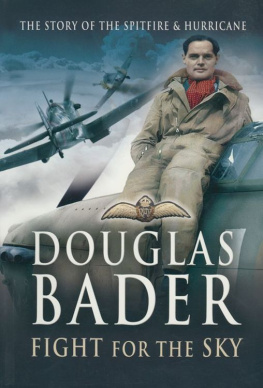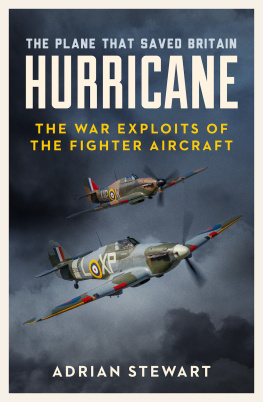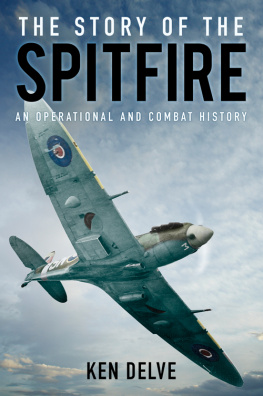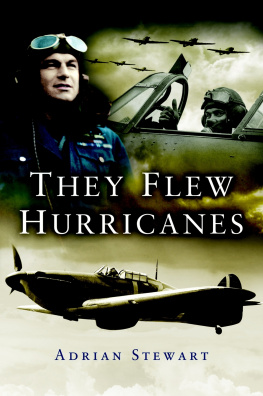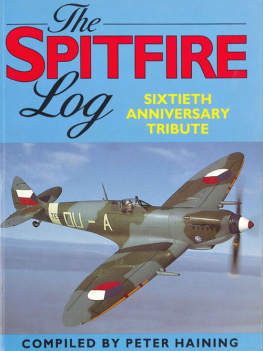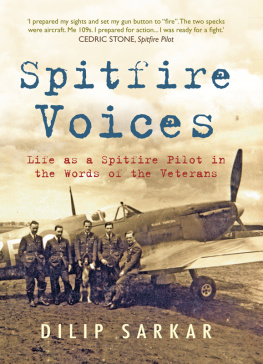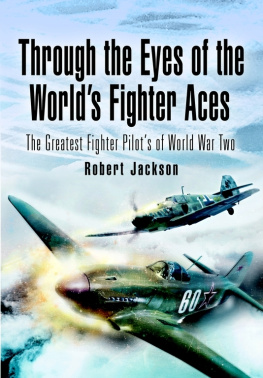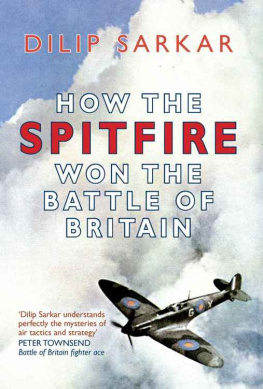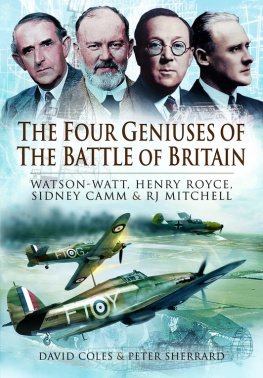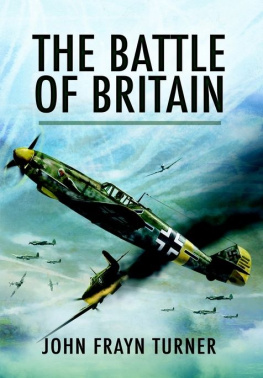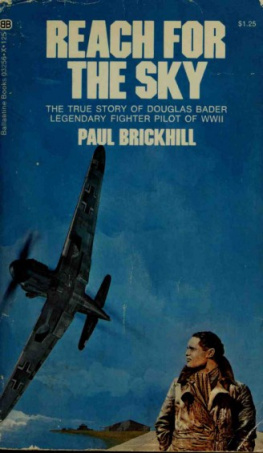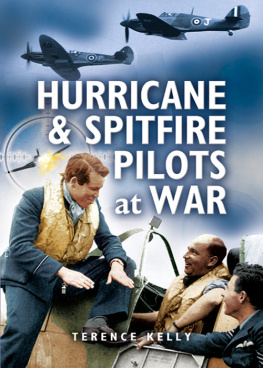DOUGLAS BADER
FIGHT FOR THE SKY
The Story of the Spitfire & Hurricane
DOUGLAS BADER
FIGHT FOR THE SKY
The Story of the Spitfire & Hurricane
Douglas Bader
Fight for the Sky
The Story of the Spitfire and the Hurricane by
Group Captain Douglas Bader CBE DSO DFC
with special contributions and help from:
Group Captain Sir Max Aitken DSO DFC
Air Chief Marshal Sir Harry Broadhurst GCB KBE DSO DFC AFC
Air Commodore A. C. Deere DSO OBE DFC
Group Captain H. S. L. Dundas DSO DFC
Wing Commander D. Gillam DSO DFC AFC
Air Vice Marshal J. E. Johnson CB CBE DSO DF
Wing Commander P. B. Lucas DSO DFC
Air Vice Marshal M. Lyne CB AFC
Special research by John Frayn Turner (the biographer of Douglas Bader)
Designed by Pen & Sword Books Ltd
Photo research by John Moore
First published 1973 by Sidgwick and Jackson Limited.
Published in this format in 2003, and reprinted in 2005 and 2008 by
Pen & Sword Aviation
an imprint of
Pen & Sword Books Ltd,
47 Church Street, Barnsley,
South Yorkshire.
S70 2AS
Copyright Douglas Bader, 1973
The Estate of Sir Douglas Bader 2003, 2005, 2008
A CIP record for this book is available from the British Library
ISBN: 978-0-85052-992-0
Printed in Great Britain by
Biddies Ltd, Kings Lynn, Norfolk
Pen & Sword Books Ltd incorporates the Imprints of Pen & Sword Aviation, Pen & Sword
Maritime, Pen & Sword Military, Wharncliffe Local history,
Pen & Sword Select, Pen & Sword Military Classics and Leo Cooper.
For a complete list of Pen & Sword titles please contact
PEN & SWORD BOOKS LIMITED
47 Church Street, Barnsley, South Yorkshire, S70 2AS, England
E-mail: enquiries@pen-and-sword.co.uk
Website: www.pen-and-sword.co.uk
C O N T E N T S
Foreword
I t is gratifying to know that the significance of the heroics performed by the RAF fighter pilots in defence of our shores against the enemy during WW2 is today viewed with sufficient importance as to demand a reprint of this book. I am honoured to have been asked to provide the Foreword for this new volume and that my husbands name is remembered by so many with almost the same reverence as the aeroplanes he flew; in particular the Supermarine Spitfire and the Hawker Hurricane.
Unfortunately I know little of either aeroplane, save to say that Douglas and his ageing colleagues would, whenever given the opportunity, sing the virtues and praises of both. I can, however, speak with rather more authority about my husband!
Without doubt Douglas was an exceptional person. He possessed an astonishing ability in life, certainly in the few years that we were together, of being able to view things with clarity and to put them into perspective. When faced with difficulty or a problem he would quickly assess the situation, take a view, decide on the requirement for dealing with the matter and then take the appropriate action to resolve things effectively, quickly and without fuss. This quality served Douglas well throughout his life but was particularly important to him during the early years following his horrific accident and then during the hostilities of WW2.

The author, 1940.
Douglass positive attitude to life and strong personality led him to becoming a much respected leader of men. His achievements as a fighter pilot flying his beloved Spitfire or Hurricane earned him recognition as a national hero. All this despite having had to overcome the severest of disabilities as a young man.
In my view, however, it was facing up to and dealing with his disability that brought to Douglass life a special understanding, appreciation and compassion. In the all too short time that we spent together he devoted much of his life to visiting and encouraging others and, particularly when with youngsters, used his own achievements as an example.
Today, some twenty years after his death, the charity established in Douglass name, and of which I serve proudly as President, strives to continue the inspirational work that he started so many years ago. The Douglas Bader Foundation offers practical support within the disabled community by supporting as many individuals as finance permits and ensures that Douglass name lives on.
Douglas was indeed a truly remarkable man, loved and admired by so many.
To me he was a remarkable husband whose warmth, humour and love brought so much to the life that we shared.
Lady Bader OBE.,
Winter 2002/3.
Publishers Note:
The integrity of the Authors original text has been intentionally retained. Readers should note that the circumstances of certain individuals referred to may have changed since first publication.
I was delighted when Lord Longford, Chairman of Sidgwick and Jackson, London, asked me to write the story of the Spitfire and Hurricane. My memories went straight back to June 1940. The Germans had by then conquered Poland, Norway, Denmark, Holland, Belgium, and France. The British people stood alone, separated from enemy-occupied Europe by twenty-one miles of blessed English Channel. Those immortal words which Shakespeare put into the mouth of the dying John of Gaunt in Richard II:
This royal throne of kings, this sceptred isle
This precious stone set in the silver sea,
Which serves it in the office of a wall,
Or as a moat defensive to a house
comforted many of us when we reflected that the English Channel was indeed a moat which provided an insuperable tank obstacle which the Germans could not attempt to cross without first defeating the Royal Air Force in particular the Spitfire and the Hurricane.
I recall as though yesterday a scene in the Mess at Kirton-in-Lindsay to which 222 Squadron (Spitfires) had returned in early June after Dunkirk. We were all standing around the ante-room at lunchtime listening to the B.B.C. news. The announcement came over the air that the French Government had capitulated. Tubby Mermagen, the Commanding Officer of 222 Squadron in which I was a Flight Commander, said: Thank God, now were on our own. He expressed the feelings of us all.

A moatwhich the Germans could not attempt to cross without first defeating the Royal Air Force in particular the Spitfire and the Hurricane (picture shows Goering and staff gazing across Channel in 1940).

A plume of black smoke from the burning oil tanks at Shell Haven stains the blue summer sky
Another memory that came back vividly was of the first time I led a squadron into battle it was against a horde of German bombers, sixty to a hundred of them flying at 17,000 feet in perfect formation. We were in the ideal position, up-sun and above them.
There were nine of us Hurricanes. Suddenly, I was angry. Who the hell do these Huns think they are, flying like this in their bloody bombers covered with iron crosses and swastikas over our country? We were flying in sections of three in line astern, exactly above the Germans.

